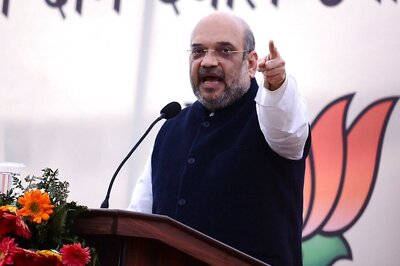
views
WASHINGTON: President Joe Biden’s administration is under pressure for a swift and strong U.S. response to the military takeover in Myanmar, a crisis that could be a first major test of its bid to work with allies on a new Asia strategy to stand up to China.
Myanmar’s military seized power on Monday in a coup against the democratically elected government of Nobel laureate Aung San Suu Kyi, who was detained along with other leaders of her National League for Democracy (NLD) party in early morning raids.
U.S. Secretary of State Antony Blinken called on Myanmar military leaders to release Suu Kyi and others detained and the White House said it opposed any attempt to alter the outcome of Myanmar’s Nov. 8 elections, while vowing “action against those responsible if these steps are not reversed.”
The U.S. government did not specify what measures might be under consideration but it could strengthen sanctions already in place and impose new ones on Myanmar.
The top Democrat on the Senate Foreign relations committee Robert Menendez said the United States and other countries “should impose strict economic sanctions, as well as other measures” against Myanmar’s army and the military leadership if they did not free the elected leaders and remove themselves from government.
“The launch of another coup is a tragedy for the people of Burma after a decade of work to establish a civilian-led democratic government,” Menendez said in a statement.
Menendez charged that the Myanmar army was guilty of “genocide” against minority Rohingya Muslims – a determination yet to be stated by the U.S. government – and of a sustained campaign of violence against other minorities.
The senior House of Representatives Democrat, Adam Schiff, also called for sanctions on “the senior military leaders responsible for this coup.”
U.S. Senate Republican leader Mitch McConnell, who like members of the Biden administration has had close past ties with Suu Kyi, called the arrests “horrifying” and demanded a strong response.
“The Biden Administration must take a strong stand and our partners and all democracies around the world should follow suit in condemning this authoritarian assault on democracy,” he said.
“We need to support the people of Burma in their journey toward democracy and impose costs on those who stand in their way,” McConnell added.
The events in Myanmar are a significant blow for the Biden administration and its effort to forge a robust Asia Pacific policy to stand up to China.
Many of Biden’s Asia policy team, including its head, Kurt Campbell, are veterans of the Obama administration, which at the end of Obama’s term hailed its work to end decades of military rule in Myanmar as a major foreign policy achievement. Biden served as vice president in that administration.
The Biden administration came into office on Jan. 20 promising to work closely with allies on major international challenges, in contrast to former President Donald Trump’s often go-it-alone “America First” approach.
The Myanmar crisis could be the first major test of Biden’s resolve for multilateral solutions.
John Sifton, Asia advocacy director for Human Rights Watch, criticized the initial White House response as “disappointingly weak” and urged it to mobilize a concerted international reaction.
“The U.S. needs to work with allies to speak more clearly, in unison, in terms of ultimatums, to put the Myanmar military on notice of the specific consequences that will occur if their coup is not reversed,” Sifton said, calling for tough sanctions.
Disclaimer: This post has been auto-published from an agency feed without any modifications to the text and has not been reviewed by an editor
Read all the Latest News, Breaking News and Coronavirus News here




















Comments
0 comment